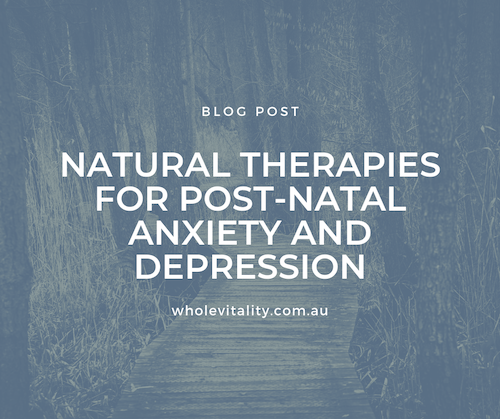Post-Natal Depression and Anxiety
How natural therapies can help

Depression and anxiety appear to be growing problems with 1 in 5 women and 1 in 8 men experiencing one or both conditions. Like many illnesses, depression and anxiety range in their severity and symptoms. Physical side-effects commonly include gastrointestinal and/or skin complaints.
It’s important to understand these mental health conditions can occur in anyone at any time, though some people may be more prone.
How naturopathic medicine can help
Often there are both physical and mental/emotional manifestations of depression and anxiety. Natural therapies, such as naturopathy, aim to identify a suitable combined treatment approach in order to make you feel better in the short-term while supporting your body systems foundations for the long-term. This holistic approach offers an alternative to pharmaceutical medication for those with mild to moderate symptoms.
You should always seek support from an appropriately qualified professional before taking any medications - herbal, nutritional or pharmaceutical - to ensure they are most appropriate for your needs.
What might a naturopath recommend?
A range of herbal and nutritional support recommendations are considered when treating a client with depression or anxiety. These include:
Omega-3 fatty acids
There is often inflammation present in these conditions. Omega-3 fatty acids (usually from fish sources) combat this with their anti-inflammatory effects.
Magnesium
Involved in over 300 enzymatic processes across the body, magnesium can help reduce irritability, stress and nervous tension as well as mood swings.
Saffron (Crocus sativus)
Saffron has been shown to improve cAMP response, improving Brain Derived Neurotrophic Factor (BDNF) as well as other proteins supporting neurotransmitter production (ie, it helps your nervous system). It also helps increase the circulation of ‘feel good’ neurotransmitters around the body.
St John’s Wort (Hypericum perforatum)
Similar to Saffron, St John’s Wort boosts neurotransmitter circulation, improving mood and cognition.
Lemon Balm (Melissa officinalis)
This perennial herb reduces feelings of anxiety through inhibiting the degradation of GABA, a ‘feel good’ hormone.
Regular nutritious meals
Mood and blood sugar levels are often related. Ensuring you are eating nutritious meals at regular intervals throughout the day, (and getting your daily quota of the five food groups), can help improve your mood.
Exercise
Movement that elevates your heart rate increases circulation, aiding the process of clearing out waste and toxins from the body, as well as providing an increase in neurotransmitters such as serotonin, which improve your mood.
Stay connected
Maintaining social connections is also vital. While you might not feel like socialising, maintaining contact with others, through support organisations and health professionals, can help you move through this difficult time. You might be surprised how much better you feel after socialising a little. Speak to someone about your struggles or just take your mind off things by sharing a friend’s company or doing an activity together.
Know that life is full of ups and downs, and mood changes such as depression and anxiety don’t have to last forever, especially with the right support.
The information given here is general in nature. For information and support specifically tailored to your needs, book an appointment today